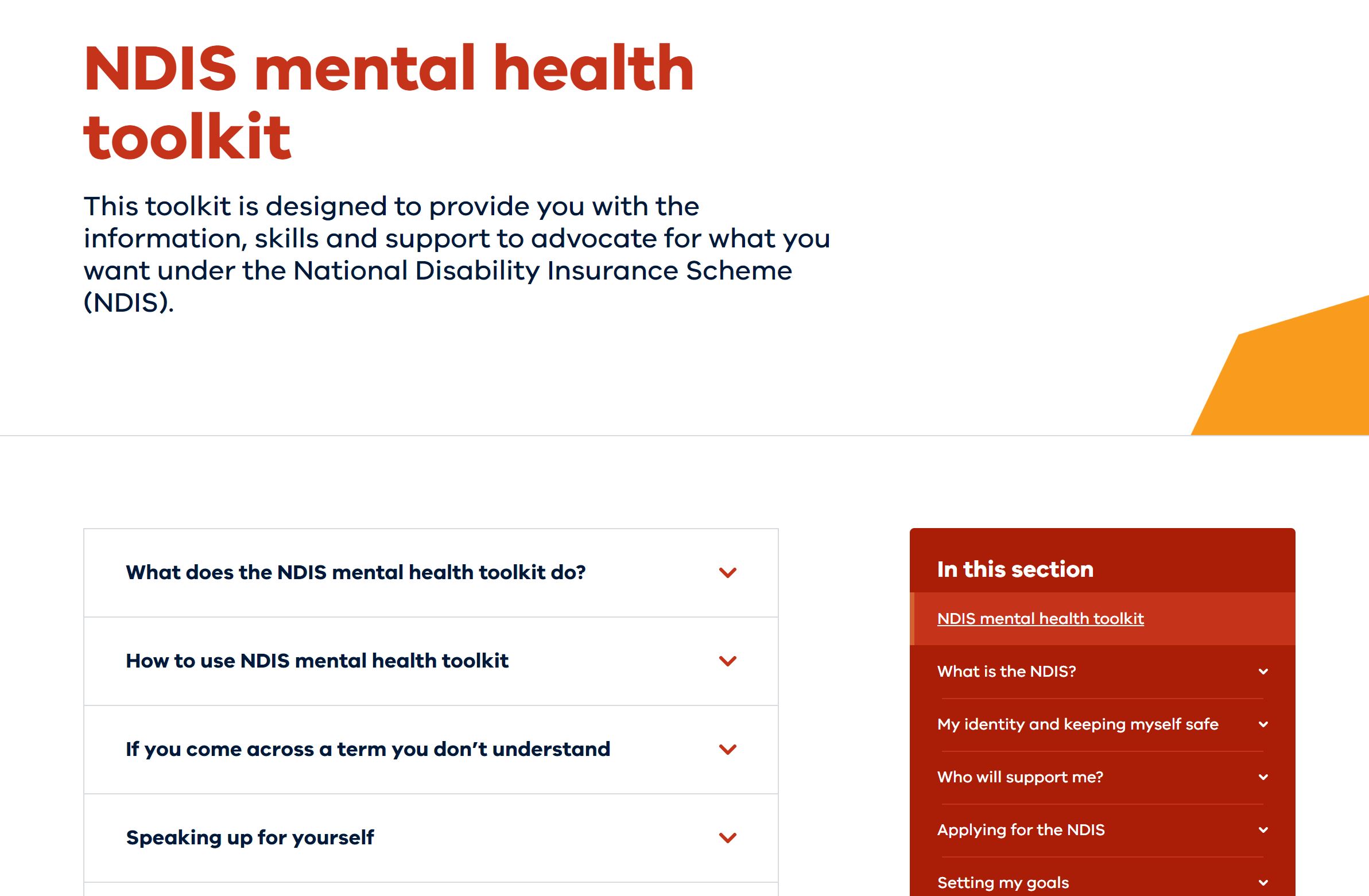Overview
If you’re living with a mental health condition and it’s impacting your daily life, you might be eligible for support through the National Disability Insurance Scheme (NDIS). This kind of support is referred to as assistance for ‘psychosocial disability’.
The NDIS provides funding and supports to people across Australia with permanent disabilities, including psychosocial disabilities. The funding provided by the NDIS is designed to enhance your functional abilities and promote social and economic participation.
It’s important to note that while the NDIS can offer valuable support, it doesn’t cover everything – some services are still part of the healthcare system. Additionally, not everyone with a mental health condition will have a psychosocial disability that requires NDIS assistance.
For more information, check out these resources that provide an overview of the support available for psychosocial disabilities through the NDIS:
- NDIS access for people with psychosocial disability (PDF 220KB)
- NDIS access for people with psychosocial disability (DOCX 298KB)
- Psychosocial Disability Access Factsheet 1: General Information (PDF 267KB)
- Psychosocial Disability Access Factsheet 1: General Information (DOCX 301KB)
Video: What is the NDIS? By NDIS Australia.
How NDIS funding can be used
What the NDIS doesn’t Cover
NDIS funding does not cover clinical treatments or clinical supports related to mental health. These remain the responsibility of the health system and include:
- Acute, ambulatory and ongoing community care
- Medications for mental health conditions
- Inpatient treatment or clinical rehabilitation
- Treatment for drug or alcohol dependency
- Psychological and other therapies that help address, stabilise or manage the symptoms that arise as a result of the psychosocial disability.
What the NDIS covers
The NDIS offers funding for non-clinical supports that can make a positive difference for individuals with psychosocial disabilities. These supports are designed to:
- Improve your functional capacity to carry out everyday tasks
- Increase your independence
- Be more involved in your community
- Participate in social, work and study life.
NDIS funding may include:
Core Supports
Assistance with daily activities, home support, community access, employment, and social participation.
Capacity Building
Developing life skills, managing daily routines, and improving financial management.
Behaviour Supports
Specialised support for complex behaviours to improve relationships and quality of life.
Employment Support
Skills development for finding and keeping a job.
Housing Support
Assistance in securing and managing accommodation.
Plan Management
Help with managing NDIS funds, administration and financial reporting
Psychosocial Recovery Coaches
Long-term recovery planning and coordination.
Support Coordination
Short-term help in understanding and using your NDIS plan.
Recent Changes to the NDIS
Since October 2024, the NDIS has implemented several significant changes affecting participants, particularly those with psychosocial disabilities:
- Stronger safeguards to prevent funding misuse
- Simplified application and review processes
- Greater focus on early intervention
- Improved clarity around “reasonable and necessary supports”
- Better coordination with other government services
- Exclusion of certain non-evidence-based therapies and lifestyle expenses
For current information about available supports:
Qualifying for the NDIS
To qualify for the NDIS psychosocial support, you must
- Be between 7 and 65 years old
- Live in Australia
- Hold citizenship, permanent residency, or a special category visa
- Have a disability caused by a permanent psychosocial, intellectual, cognitive, neurological, sensory, or physical impairment that requires disability-specific support for daily life activities
Learn more: Am I eligible?
How to apply for the NDIS
If you think you are eligible for the NDIS, you can take one of the following steps:
- Contact your local or a local NDIS partner or call 1800 800 110 to request that an NDIS Access Request Form be mailed or emailed to you.
- Download and complete the NDIS Access Request Form on your computer and email it to enquiries@ndis.gov.au with supporting information.
- Download the NDIS Access Request Form on your computer, print it out, and send it to PO Box 700, Canberra, ACT 2601, with your supporting information.
- Call the NDIS on 1800 800 110 for assistance in applying for the NDIS.
Learn more: How to apply
What happens once approved
Once you’re approved, generally here what you can expect:
- An NDIS officer will reach out to you to set up an initial meeting.
- During the meeting, you will talk about your support needs. Feel free to take a support person and any helpful supporting documents you have..
- You have the option to choose how you want to manage your funding, whether it’s self-managed, plan-managed, or NDIA-managed.
- An NDIS planner will assesse your information and decide on the supports that will be approved for you.
- You’ll receive your official NDIS plan along with an invitation to an implementation meeting.
Choosing NDIS providers and support
After receiving your plan, you can select providers that best suit your needs.
See How to Choose NDIS Providers for Mental Health for guidance.
Your rights under the NDIS
Under NDIS Act and Quality and Safeguards Framework, you have rights:
- You have the right to support: You can bring or engage a support person at any stage of the NDIS process – formal or informal.
- You have choice and control. You can choose and change providers, select suitable supports, and decide how they are delivered.
- Quality and safety: You have the right to receive safe, high-quality supports monitored by the NDIS Quality and Safeguards Commission.
- You have the right to complain: You can provide feedback or file complaints at any stage.
Next Steps
Thinking about applying for NDIS support for mental health? Here are some tips to get you started:
- Chat with a local area coordinator, your GP, or a mental health professional who knows about the NDIS. They can really help guide you.
- Gather supporting evidence about how your condition impacts your daily life. This will be important for your application.
- Take time to prepare your application. Don’t hesitate to ask for support if needed.
Need help with your application?
Reach out to the NDIS on 1800 800 110.
Frequently Asked Questions
Does the NDIS cover a temporary mental health condition?
No, to be eligible for the NDIS, your condition must be permanent or likely permanent. However, episodic conditions can qualify if they have a permanent impact.
How is "permanent" defined for psychosocial disabilities?
For NDIS purposes, “permanent” doesn’t mean your condition can never improve.
Instead, it means that your condition is expected to be lifelong with significant functional impacts despite treatment.
The NDIS recognises that psychosocial disabilities can be episodic, with varying levels of impairment over time.
Can I get NDIS funding if I'm already receiving other mental health services?
Yes, the NDIS complements, rather than replaces, other services.
For example, you can receive clinical mental health treatment through the health system while receiving NDIS funding for non-clinical support.
What evidence is most helpful when applying for NDIS with a psychosocial disability?
The strongest NDIS applications include detailed documentation from mental health professionals who are familiar with you.
The supporting documentation details how your condition affects your daily functioning across various areas, such as self-care, mobility, communication, and social interaction.
Records that demonstrate the persistence of your condition over time are also valuable.
What if my application is rejected?
Yes, you can ask for a review of the decision, gather more evidence, or even reapply with other information about how your condition affects your daily life.
Can I change my supports if my needs change?
Yes, if your circumstances change significantly, you can request a review of your plan.
NDIS plans for psychosocial disability typically get reviewed every 12 to 24 months. But if something major happens in your life, you can ask for an earlier review.



